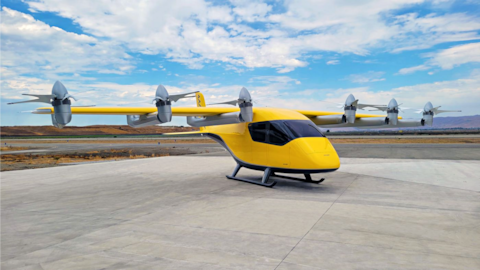Boeing-backed Wisk Aero reveals self-flying four-seater air taxi
What's the story
Boeing-backed Wisk Aero has revealed an all-electric, four-seater autonomous air taxi. Currently, the company is seeking approval from the Federal Aviation Administration (FAA) to begin the commercial air taxi service.
The sixth-generation aircraft will be controlled primarily by an autopilot system, with remote human pilot supervision.
It will use the rooftops of buildings as "vertiports" for takeoff and landing.
Context
Why does this story matter?
Formed in 2019, air taxi startup Wisk is vying to be recognized as the first advanced air mobility company to receive FAA's grant for passenger testing.
Analysts anticipate that the flying taxi market could generate $150 billion revenue by 2035. Therefore, Wisk is aiming to strengthen its operation within the next five years by covering 20 major markets globally with 14 million annual flights.
Mandates
What comes under FAA certification?
The Federal Aviation Administration was established to organize congested airspace and ensure its safe and effective use.
Before launching a commercial service, aviation companies need to obtain three certifications from FAA.
"Type certification" denotes the aircraft meets FAA design and safety protocols.
"Production certification" approves that the company can manufacture aircraft.
"Air carrier certification" permits companies to conduct commercial air taxi services.
Highlights
All about Wisk Aero's sixth-generation aircraft
Wisk's aircraft is equipped with six front rotors, each with five blades that can tilt horizontally and vertically.
The four-seater autonomous air taxi gets six rear rotors, each consisting of two blades that remain fixed vertically.
The company claims that the aircraft can fly at 2,500-4,000 feet altitude above ground with 120 knots (nearly 222km/h) speed, and 90 miles (around 144km) range with reserves.
Information
Air taxi startup aims to cover 20 major markets globally
Wisk plans to offer an app-based inter-city flying taxi service. The company plans to introduce its air taxi service in around 20 major markets with 14 million flight operations on annual basis, within the next five years.
Face-off
Involvement of other companies makes flying taxi market highly competitive
Wisk claims that its sixth-generation aircraft will be the first-ever electric vertical takeoff and landing (eVTOL) candidate with FAA certification.
However, it is not the only contender in the race. Businesses such as Volocopter, Joby Aviation, Archer, and Ehang have asserted that they are about to introduce autonomous air taxi services.
They have even been able to secure financial backing from well-known automobile brands.
